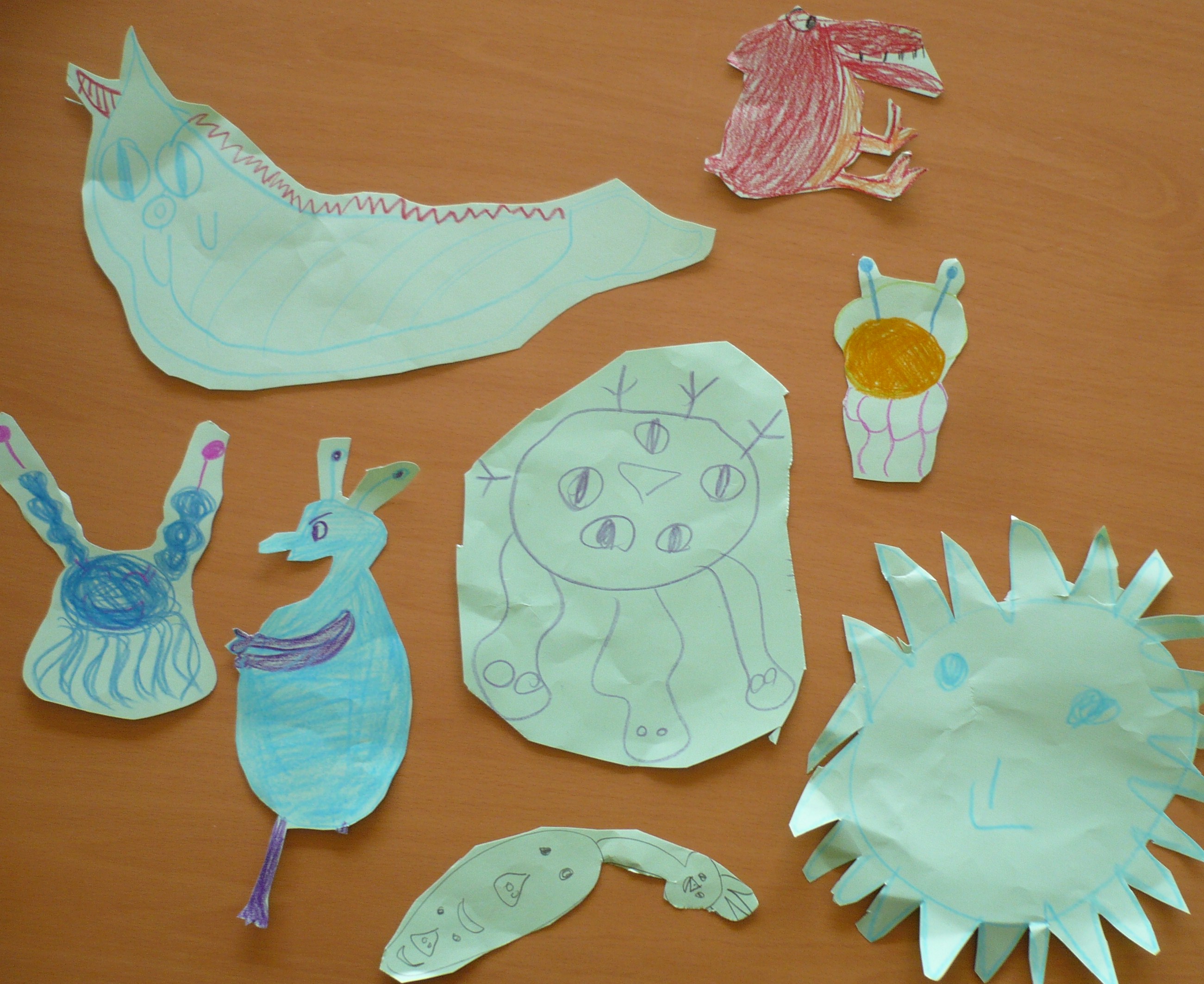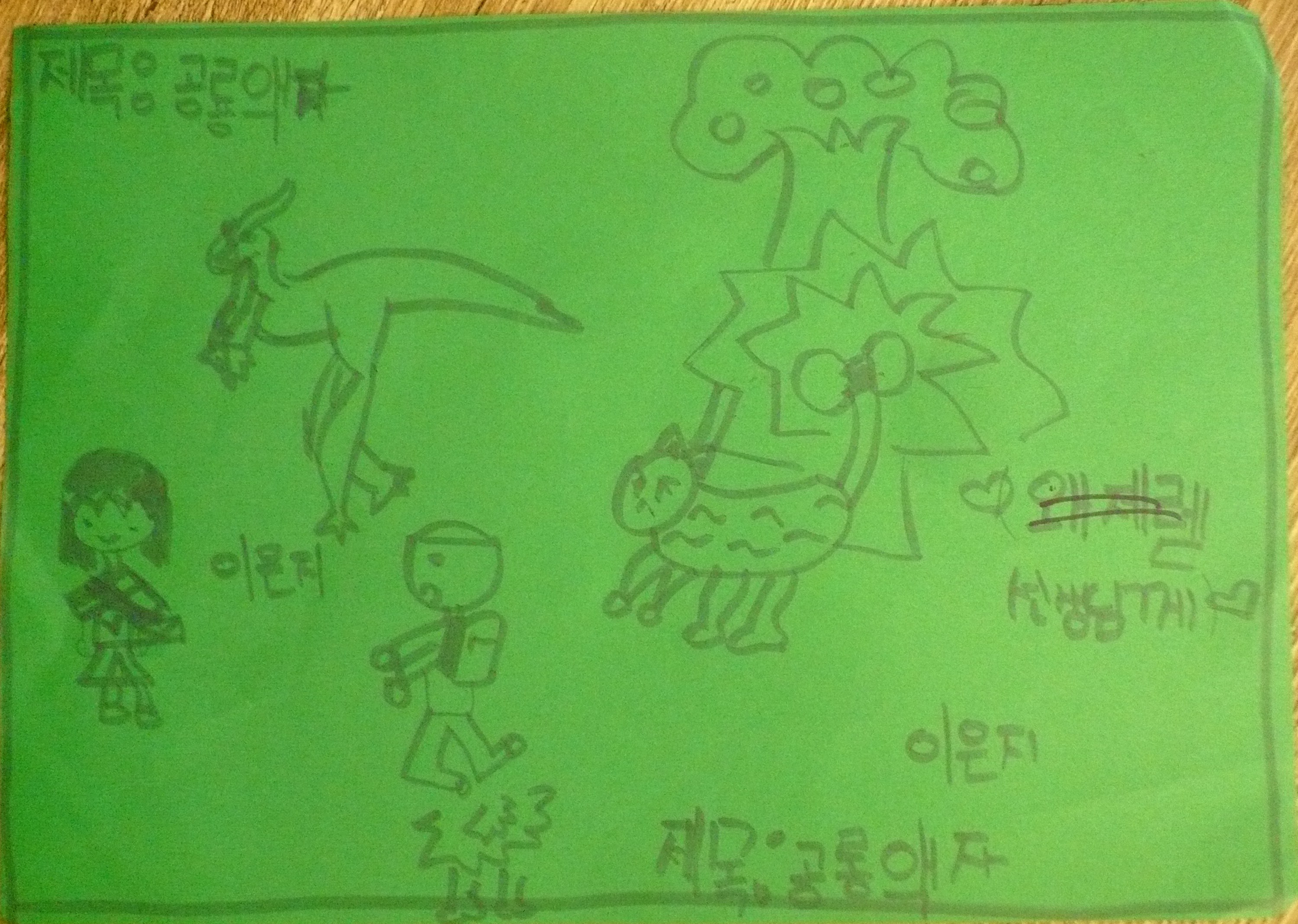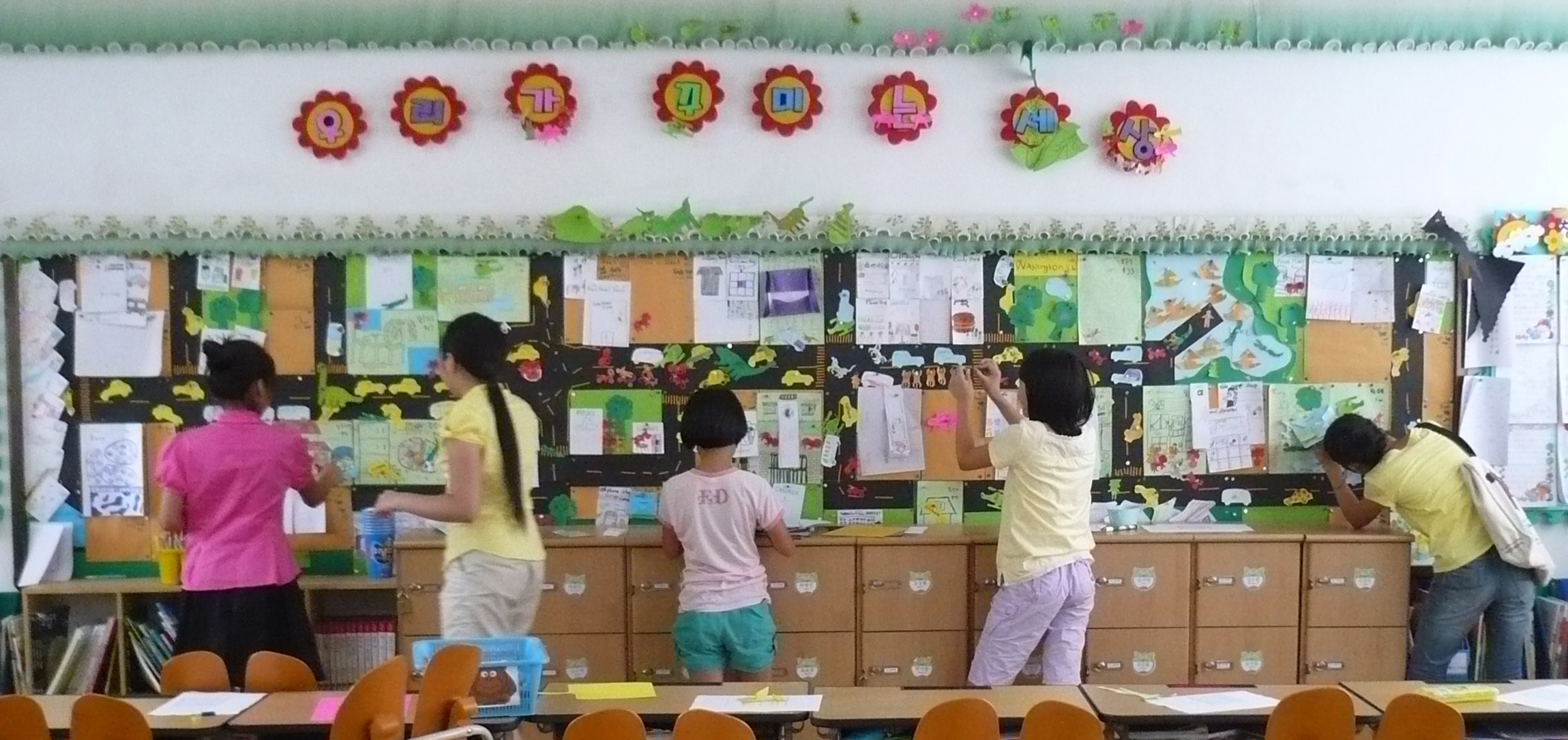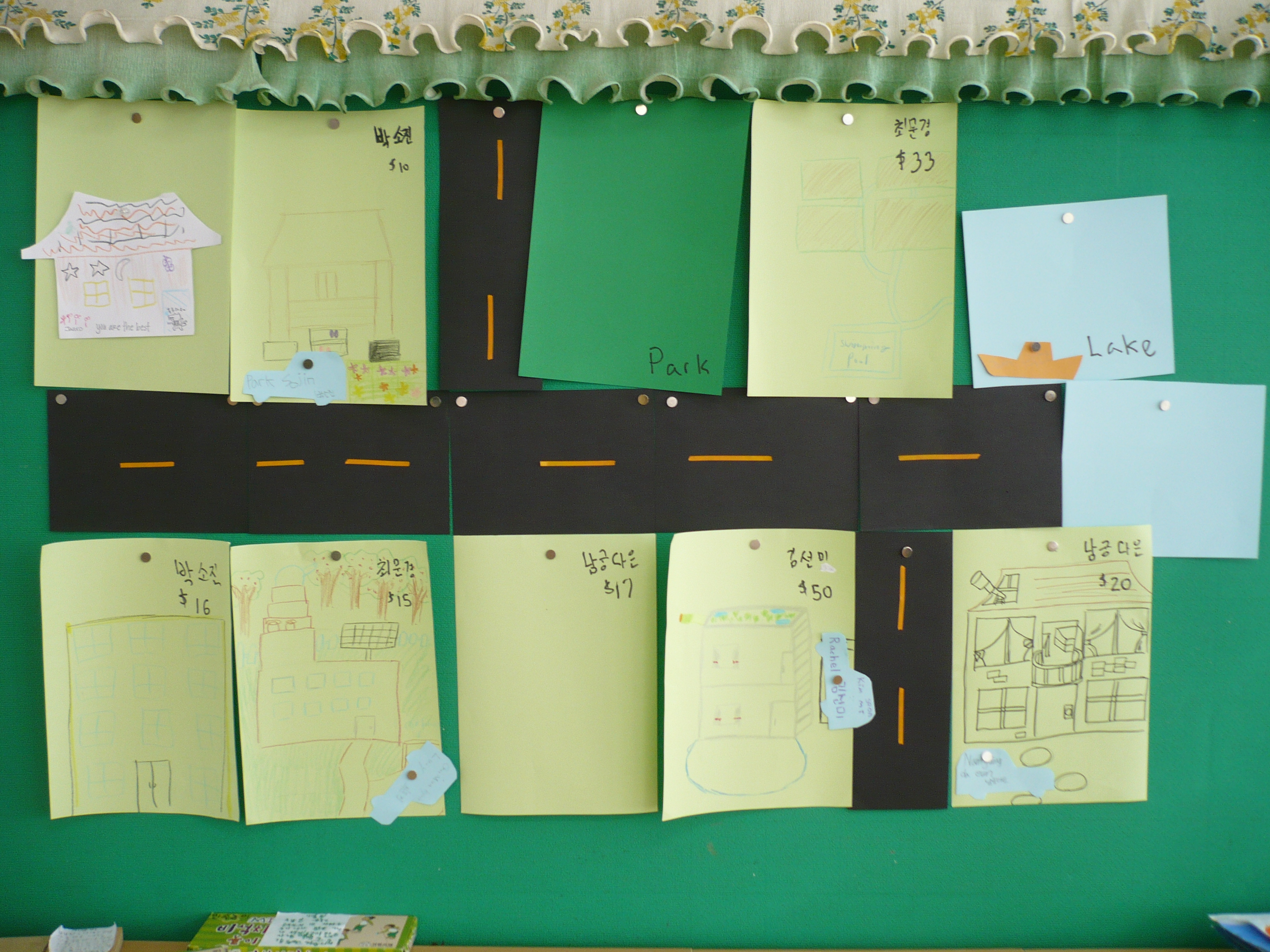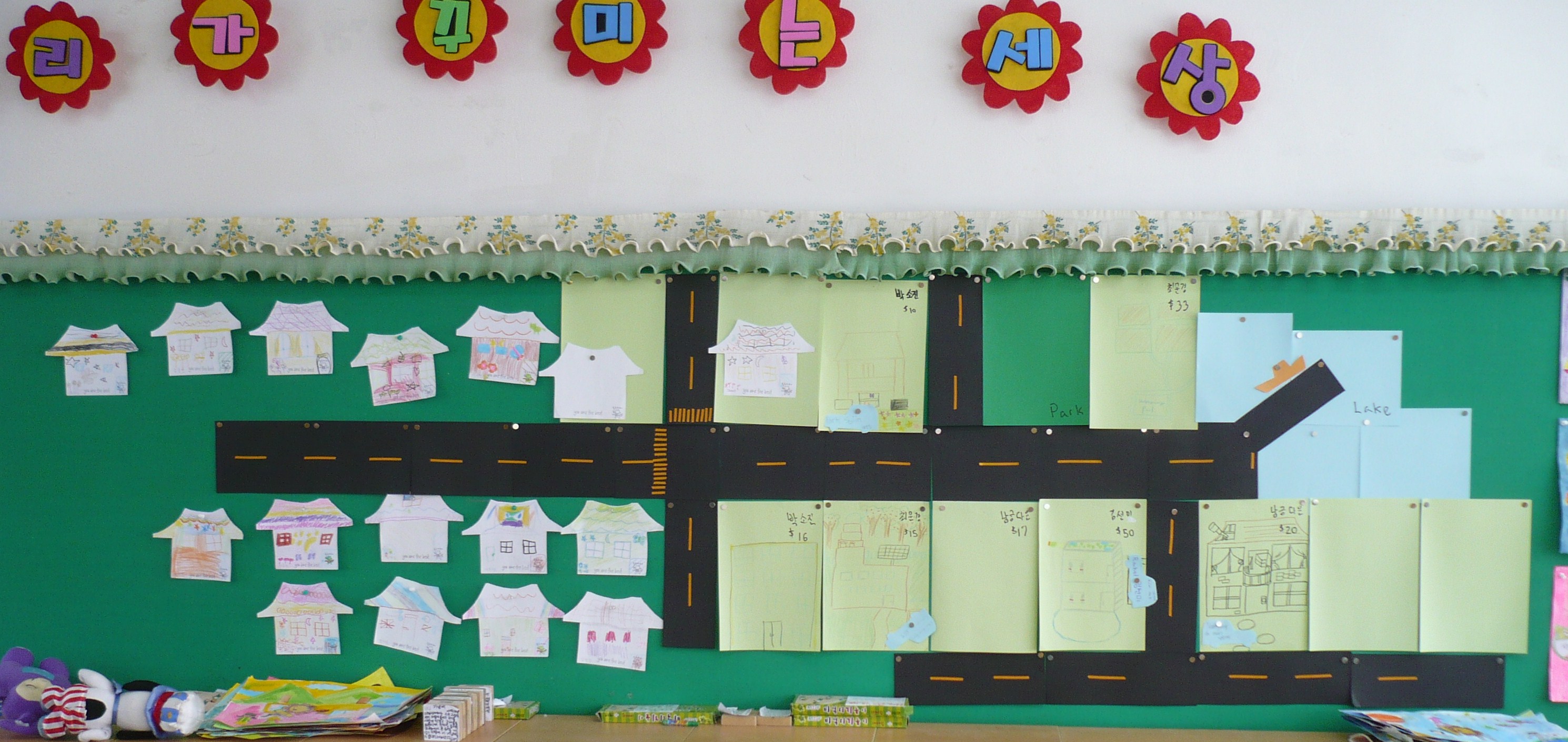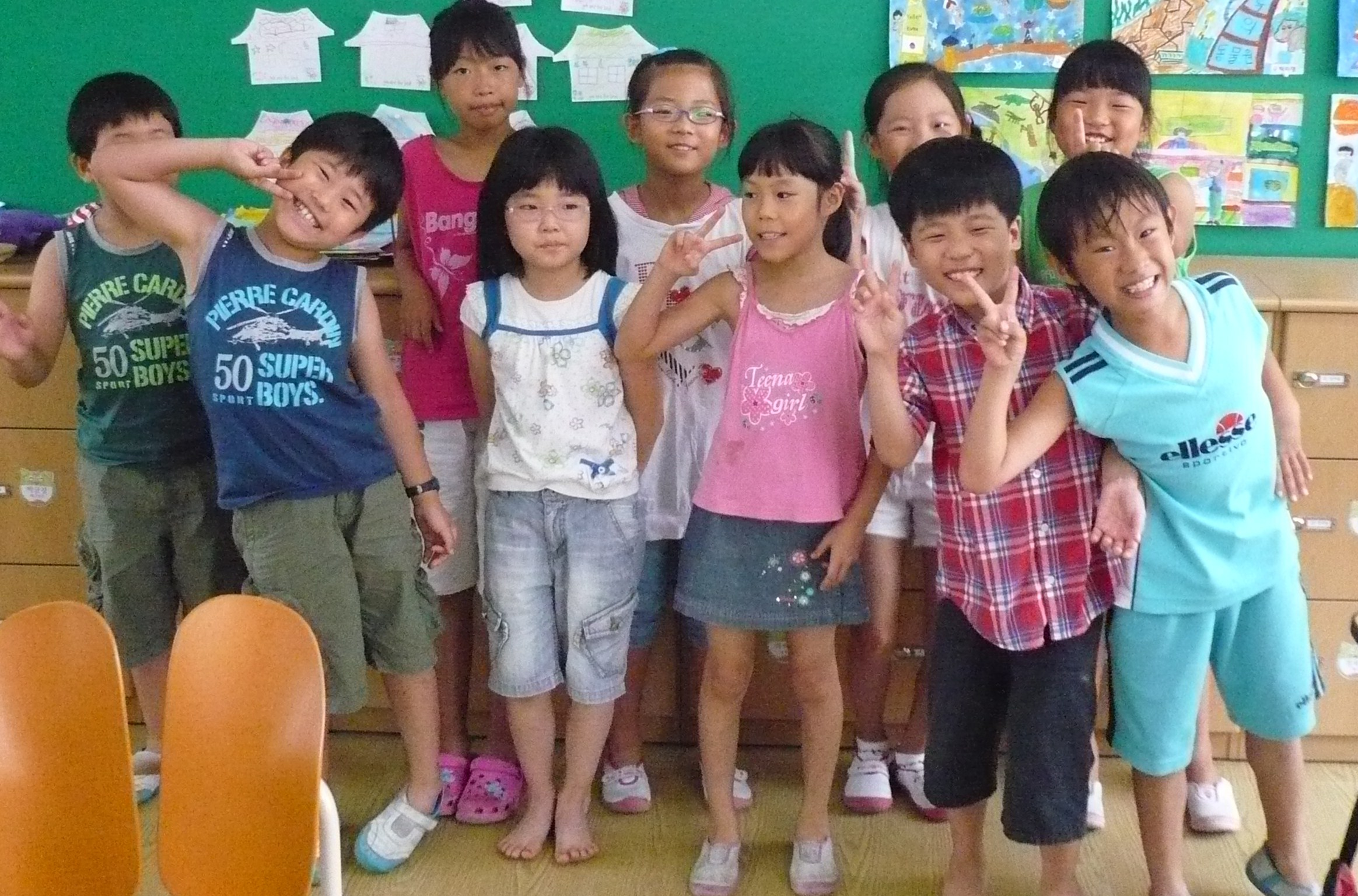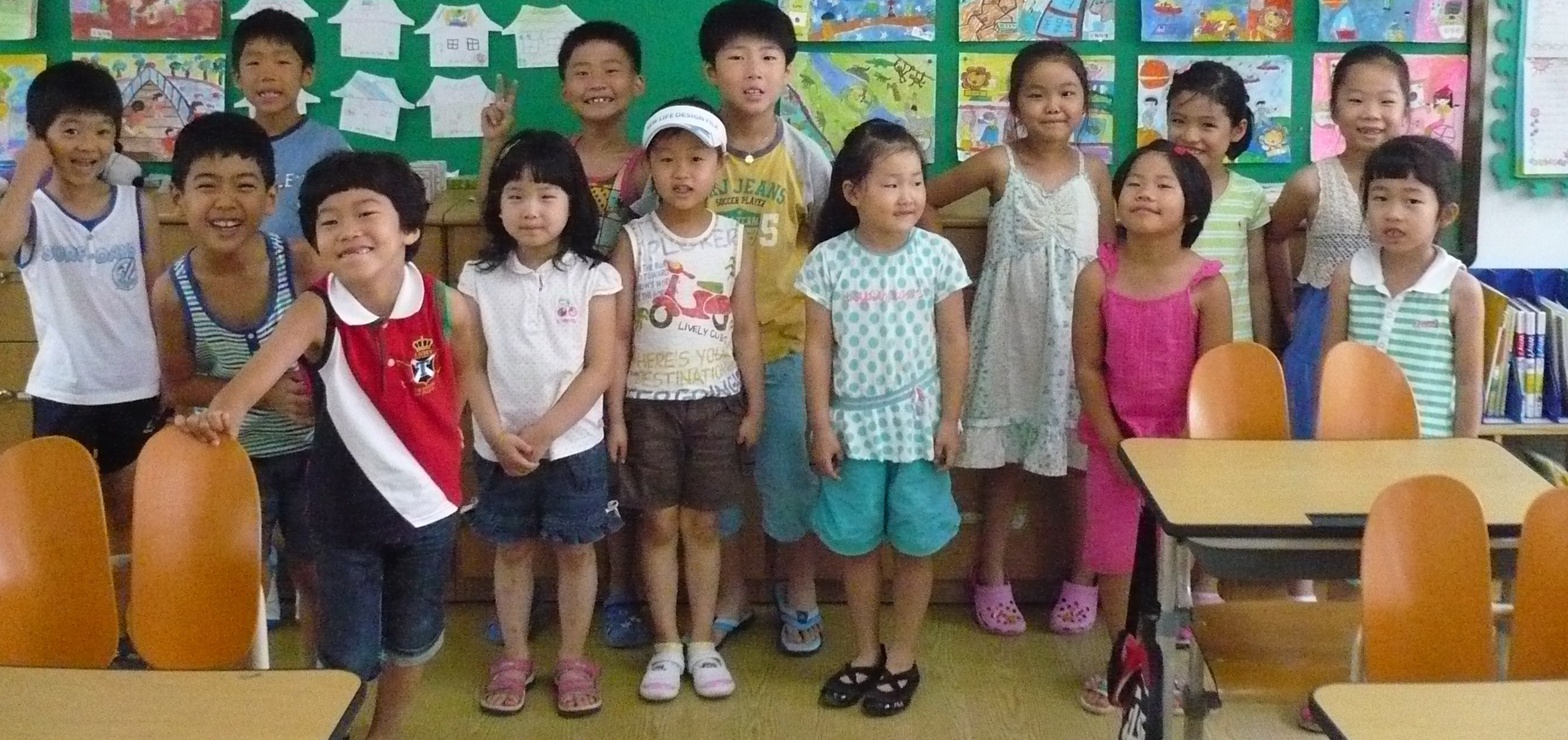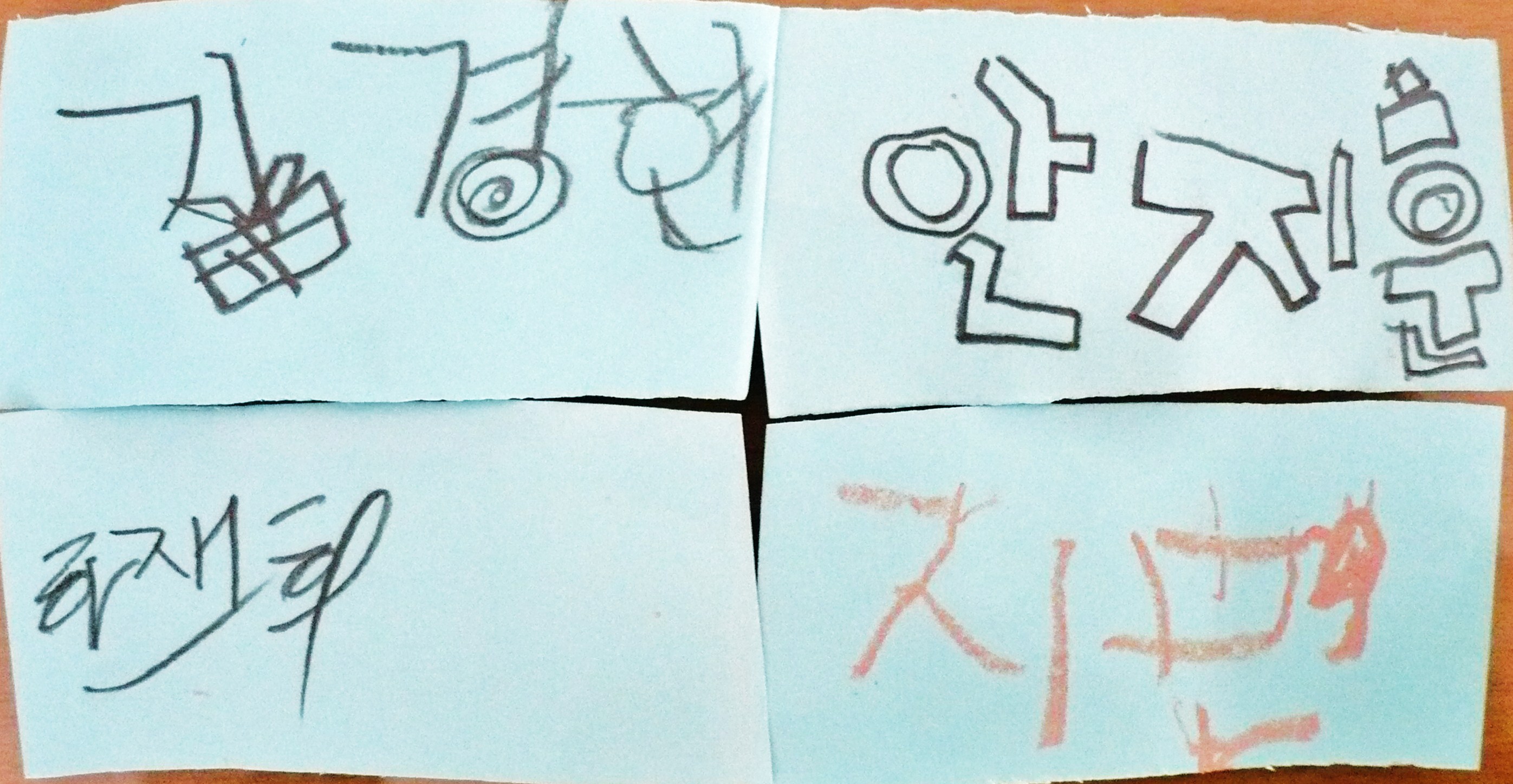It was one of those miraculous, happy days, when putting up with all the sociopathic administrator bullshit becomes totally worth it. What I mean to say, is the kids came through. They delivered happiness and joy.
One student wrote to me: 당신은 특☆해요! (and explaining that ☆ is read as 별 = “star”), hence “당신은 특별해요” [dang-sin-eun teuk-byeol-hae-yo = you are special]. Aww, shucks. I thought that’s what teachers were supposed to write to their students, not vice versa.
Then, I was in the courtyard, with about five minutes before having to go upstairs to the third grade. A group of third graders saw me, and said, oh, teacher, you must come to class. They grabbed me by my hands and hauled me up the stairs as if I was an unruly child, and then when I got there, things were still clearly in a state of recess, so I said, why am I here?
“Fun!” was the chorus.
In another third grade class, I was going through my beginning-of-class routine – I ask students (not always every single one, but at least half, one by one) “how are you?” I try to get them to vary their answers, and not always use the pat “I am fine” that they all seem to learn early on. And whatever their answer, I occasionally ask “why?” and try to get them to give some information as to why they feel the way that they do.
So… I asked one student, “how are you?”
“Oh! Very happy,” calm, but grinning.
“Why?”
“Because you.” And she pointed at me. I almost blushed in self-consciousness.
That was pleasing.
Finally, I was in my evening “gifted students’ class” which is at the county education office here in Yeonggwang. I have about 22 smart – and smart-alecky – but not always focused sixth graders. Things had been feeling a little bit slow. But then I introduced them to my Jeopardy quiz show concept. And they ran with it.
We had to modify the rules a little bit, because it was such a large group (22 contestants is a lot, to have to consult each student’s answer individually). But it worked very well: I had them scrawling down answers on scraps of paper and throwing them at me, I would read their answers and say “good” or “bad.” I would award money (yes, my ubiquitous play money) appropriately. And the kids started to have a huge amount of fun. They would write truly funny things when they didn’t know the answer. I would read them in my best game-show-host demeanor, and then begin laughing uncontrollably and toss the scrap of paper with the answer back into the crowd. It had the same atmospheric as one of those always playing Korean comedy game shows. It felt very successful. Everyone was laughing. No one noticed it was time to leave.
I walked home and passed the pizza place where some of the expats meet on Fridays… I didn’t really even realize I was walking along that particular street. The owner saw me and leaned out the door, “안녕하세요.” I answered in kind, “예, 안녕하세요.”
Category: Teaching & Methodology
Caveat: Fascinatinger
"I try to make things fascinatinger." – Ira Glass (host of NPR's "This American Life" show).
My thought: the key to life is to stay interested. That's where living in a foreign country and teaching children come in – they keep me pretty interested, even if things aren't always easy or perfect or convenient.
I have begun to really enjoy my first graders, even though I have yet to have a "good" class with them – they're so unruly, so chaotic, so difficult to calm down and control even for a few minutes. Their picture will be included in a definition of the expression: "…like herding cats."
So why am I enjoying them? Hmm… I think it comes down to the same reason I enjoy trying to learn Korean – the sheer perverse difficulty of the undertaking, in and of itself, is what I enjoy.
I see the little ones, my first graders, filtering into the classroom, and I watch myself carefully. What am I doing that "works"? What am I doing that "doesn't work"? How does the dynamic among the children inevitably result in milling, leaping, sitting-on-the-kid-next-door, shrieking, impossible-to-control chaos?
Caveat: Coleslaw after conformity
I keep craving coleslaw. It's not like I'm not getting enough cabbage – my two daily doses of kimchi, and all that. Fortunately, ingredients for passable coleslaw are easy to come by – unlike some things I crave, like Mexican food, which have ingredients that are downright impossible to come by.
So I made some coleslaw. You know, chopped cabbage, carrots… I like to add some chopped apple, for the tart sweetness, and maybe some raisins. I have some "coleslaw dressing" which is basically something mayonnaise-like that Koreans apparently use. But I also have some horseradish sauce, which gives a nice flavor. And a shake of vinegar. My only peculiar innovation: I add some "drinking yogurt" (which is always sweetened and flavored in its Korean variety – but that sweetness can be a nice offset in the coleslaw, I guess). It's pretty good.
Yesterday was a strange day at work. I had no classes – the third grade was doing some special book-report-festival (is it possible to have a book report festival?). But I ended up extremely busy, since Ms Ryu asked me to do practice JET speaking tests. Fortunately, I was prepared and experienced in doing such a thing, so it went quite smoothly, and I spent the day asking high-end students questions and scoring the competence of their answers.
Then, in the afternoon, we were working hard to meet more of the vice principal's arbitrary demands for making our new classroom adequate to his expectations – putting military-style (meaning very very very dull and uniform) labels on everything, and making sure nothing in the room looks too personalized or fun – god forbid our new, high-tech classroom looking like a warm, welcoming place.
So I tried to put myself into an army mindset and just line everything up… pretending, in my mind, that some high-level colonel was going to come a-inspectin'. Probably, this isn't far from the truth – the power plant bigwigs that are paying for all this remodelling are bound to come around at some point, soon, to see how the school's spending their money. And they're nuclear power plant officials – they're going to like seeing lots of sterile uniformity – it will match their expectations for order and good design. So, actually, I have some small sympathy for the vice principal's position. But that doesn't mean he needs to be so… inhumane.
Caveat: Intrinsic or Extrinsic?
In education psychology, at least at the introductory level that I've been exposed to, there is a distinction drawn between intrinsic motivation and extrinsic motivation.
Intrinsic motivation is supposed to be motivatation that arises from "desire to learn" type impulses, the inherent rewards of figuring things out, that type of thing. It's generally characterized as "good" motivation.
Extrinsic motivation is motivation that arises from outside, like offers of rewards (typically, candy, it seems, if you're teaching English in Korea), etc. It is sometimes characterized as less effective.
I've always been uncomfortable with the distiction – while still nevertheless not entirely comfortable with giving extrinsic rewards to students, either.
Yesterday I had an amazing afterschool class with my third graders, that brought to the fore my discomfort with these categorizations of motivation and their typical characterizations.
As some of you know, I've been experimenting with building a "classroom economy." It's based on a town, which is currently attached to a bunch of poster-boards that I assemble for each class, lacking a permanent "home classroom" in which to operate. I'll add some pictures, sometime (I took a lot of the one we made on a bulletin board, over the summer, but have neglected picture-taking since the fall term started).
The town has land and money and salaries and buying and selling. Things like that. It's pretty simplistic, for the third graders, but they really love it. And yesterday, I did an experiment. I wanted to do a lesson where we could practice "giving directions": "go straight"; "turn left"; "stop; etc.
I told the kids that we would practice for a while, and then we would have a race. But not like a physical race. They had to give ME directions, while I was "driving" a little paper car around the town. The kids would get flustered, and say "go left" when they meant "go right," and I would immediately drive the little paper car off a cliff or a bridge and making exaggerated crashing noises. But it was all about preparing for the "race" – because I had promised a prize purse to the winner. The winner of this race was going to get a thousand dollars. That was substantial cash in the scale of the classroom economy. Every single student was BEGGING to practice, for this race (which will occur next class).
So my philosophical question: was this extrinsic motivation? Or intrinsic? What was going on, psychologically? They wanted to win the money. That's considered extrinsic. But the money is just play money, and it's limited to inside the classroom economy. And they really seemed to be having fun, too, making my car crash as they gave me directions, and trying to find the location I'd told them to give me directions to. It seemed really intrinsic.
I don't know the answer. I'm posing a question.
Caveat: The Venal Vice Principal Devours My Patience
Donald S. Lopez, Jr., in his book The Story of Buddhism, discusses the bodhisattva Shantideva's argument for patience. Lopez writes,
When someone strikes us with a stick, do we become angry at the stick or the person wielding the stick? Both are necessary for pain to be inflicted, but we feel anger only for the agent of our pain, not the instrument. But the person who moves the stick is himself moved by anger; he serves as its instrument. If we are directing our anger against the root cause of the pain, we should therefore direct our anger against anger.
Today, my patience was tested. I didn't fare so well – I felt a lot of anger. Mostly, at my vice principal, who seems to be a petty bureaucrat, an unkind person, and, most disturbingly, a venal, xenophobic buffoon. Yes, all of those things.
I didn't enjoy how his capricious commands ended up leading to my personal possessions and space (what little remains for me at my school – it has been reduced to a shelf in a cabinet, in essence, nothing more – no desk, no closet, no work area) being invaded, rearranged, and disregarded, while I was away teaching class. I had to go dig my bag of stickers (prizes for students) out of a heap of seeming trash, and my toothbrush and toothpaste was in another pile.
The vice principal isn't so much a 'stick' being wielded by anger so much as a 'stick' being wielded by incompetence, I would say. Combined with an utter disregard for human kindness. That stick, in turn, wielded the stick of my coworkers' disregard for my personal space, which struck me and led to anger. I felt anger.
The man is a caricature. If I was watching a Korean drama, and there was to be an annoying, incompetent-to-the-point-of-dangerous, petty bureaucrat, he could fill the role, without having to take acting lessons of any kind.
I need to just get over it. It's no big deal, right? Where's my patience? I really don't want to become one of those people who spend all his time in Korea complaining about Korea. That's just… a waste of my time. Right? I meet people like that, all the time, and they drive me nuts. But jeez… I've felt so much frustration, lately. With the language. With the bureaucratic incomptence of my school's administrative staff. With my commute. With just this and that.
Caveat: Cute Monsters, Kimbap, Cake, etc.
Thank you, all, for the happy birthday wishes!
This blog post will be a disorganized miscellany.
1. We made “monsters” in my first-grade afterschool class on Monday. This picture shows some of my favorites.
2. On Tuesday, our “Yeonggwang Study Group” of foreign teachers, that’s been taking shape to try to study some Korean Language together, met at Anelle’s and learned how to make kimbap (a sort of Korean take on what Americans call “California Roll” and often incorrectly identify as sushi, which is something completely different). Kimbap has things like radish, ham, crab, cucumber and carrot rolled together with rice in a sheet of seaweed. Here is a picture of my first-ever kimbap that I made.
3. I have so far received 16 happy-birthday wishes on facebook, as well as several non-facebook induced emails. Not only that, but several of my English-teaching colleagues at Hongnong Chodeung Hakgyo threw a sort of surprise party for me, with a little fruit-topped cake bought from the Yeonggwang Paris Baguette shop. I was deeply flattered and touched. Birthdays are hard for me – they always have been. I have a deeply disharmonious relationship with the passage of time, and birthdays are a notably overt marker of this. But it’s pleasing to be “appreciated” by a little party, especially since it was a genuine surprise – I really wasn’t expecting it.
Caveat: News over. Bye.
Some students in my last hour afterschool class, making imaginary newscasts, last Friday.
Caveat: Zero of the most important things
Hard, hard week. I'm pretty frustrated.
The two most important things in my life right now are: 1) improve my teaching; 2) improve my Korean language ability.
I made progress in exactly zero of these two important things, this past week.
With respect to teaching: it was a challenging week, with chaotic, misbehaving children, messed-up lesson plans, a feeling of dullness and lack of dynamism in my interactions with kids.
With respect to trying to improve my Korean: it seemed like every time I tried to say anything in Korean, I was hyper-corrected, laughed at, mocked, or ignored. And the Koreans wonder why we Westerners so often give up on trying to learn the language. When you're told "you're saying that wrong" ten times in one day, when you're laughed at for trying ,when you're stared at incomprehendingly after having spent over five minutes carefully trying to craft a meaningful sentence in your head before giving it utterance, you begin to lose hope.
Caveat: Growing Up as an Anchor Baby in Hibbing
I found an interesting editorial in the LA Times about the concept of "anchor babies," with a Korean angle. I think it's worth reading.
Starting last week, my new schedule included the sixth grade (in place of the fourth graders who I was with in the spring), for the "main curriculum" English classes. And then this week, all sixth grade English classes were cancelled, because the sixth graders got to take a class trip to Jeju.
So I'm finding myself with some time to kill, at work. This, combined with the fact that we have finally begun to settle into our newly remodeled English classroom (pictures coming soon, maybe), meaning that there's an actual computer with actual internet access that doesn't have a line of teachers waiting to use it like the ones in the staff room. Hence my websurfing activities.
Caveat: The English Teacher K
Yes, another Kafka reference.
I go to work yesterday, only to find out I don’t need to be there. The groundskeeper asks me “오늘 수업 있어요?” (“have class today?”) and I say I don’t – I knew that. But I thought I still had to be there. I’m not quite sure how to phrase that, in Korean. Then he asks me why I’m there. No one else is around. I go to the classroom I’d been using for my summer classes, just as a place to hang out and a computer to sit down at. I text some coworkers, and await their response.
Finally, they text back that, indeed, I didn’t need to be there. I contemplate feeling angry, but decide that “showing up for work when you don’t need to be there is better than NOT showing up for work when you DO need to be there.” Hmm, what to do?
I walk back down through the courtyard. There are some children, hanging out. “Hi kids,” I say. “Why are you here?”
Big googly eyes, showing utter non-English. Yeah… how would you feel, if some guy spoke English to you, after a wonderful, month-long summer vacation? I recognize the little girl from a fourth grade class, from the end of July. So I ask, “학교에 왜 왔어요?” (“to school why came?”)
“그냥,” (“just whatever”) she answers. Big, pleased-looking smile. Kids do this, in Korea. They come to school when it’s not in session, just to hang out. That’s especially interesting, when the school’s been transformed into a giant construction zone – two workmen carrying bags of cement trundle past us.
I poke my head in the teacher’s workroom, one last time. My colleague Mr Lee is there. Look of utter surprise. In Korean, he begins something to the effect of “why are you here?”
“오늘 일하야 하지 않아요… 잘 몰랐어요.” I know this is bad, awkward Korean, but he tilts his head and grins in understanding – its message makes it across the barrier. (“today work not have to… didn’t know”)
I leave the school. I have a free day. Completely unexpected. Well, not completely. I remember thinking on Friday… I’d thought, what are the chances I show up on Monday, and it turns out I don’t have to be there? But when I’d asked a coworker on Friday, they’d said, “no kids Monday, but yes we have to work.”
I decide to take the bus to Gwangju. Maybe hang out in a Starbucks or something. I do that sometimes. Got to support that Starbucks stock in my 401K, right?
I study Korean for a few hours – mostly vocabulary – something I haven’t done in such a focused manner in quite a while. Then I think, really, I should go find the immigration office. I have this pending bit of bureaucracy that needs finishing: I need to get a “multiple re-entry” stamp to go with my visa, for the event that I decide to travel outside of Korea – so far, I haven’t felt like traveling outside of Korea, and the soonest plan to do so would be next February, but having a free day during the work-week, in Gwangju, is pretty rare, so I might as well try to take care of it, right?
I log onto the internet using free wi-fi, and go to maps on naver.com, to find the immigration office. It’s not where I thought it was – good thing I looked. I walk around downtown Gwangju, then take the single-line subway out to Hwajeong station, and walk through this very much under construction neighborhood to the immigration office. As I arrive, it begins to rain. Why is it that every time I arrive at an immigration office in Korea, it begins to rain? I’m serious, I’ve been here 3 years, and this always seems to happen.
When I get into the immigration office, the place is more internationally chaotic than a Los Angeles branch of the California DMV. There are at least 50 dispirited-looking people in queue (taking little numbers) ahead of me, playing with ballpoint pens and forms. Sitting in chairs and standing around, enjoying the airconditioned office, away from the stunning humidity outside.
I hear vietnamese, tagolog, russian, english, chinese, some-other-language. Ah… nevermind. Maybe I’ll try to figure out how to do this online? Or come back some other day, when half the foreign population of Jeollanamdo hasn’t got business at the immigration office.
I go to E-mart (Wal-mart, since Wal-mart abandoned the Korean market some years back, the local partners re-branded as E-mart, but it’s still basically Korean Wal-mart). The sky is beautiful, as I walk. Clouds scudding.
I find some good Australian cheddar cheese for sale, there, unexpectedly. I buy a new shirt. I go to the bus terminal, nearby, and have a “toseuteu” (“toast,” which really means a grilled egg sandwich). I go back home.
Strange, directionless day, yesterday.
Oh… I just had a strange, strange thought. What if you sat down to read Kafka’s The Castle, but you were given one bit of information before you started: “The Land Surveyor K is a bodhisattva.” Wouldn’t that utterly change the meaning of the book?
Caveat: Let People Live In Your Heart
I want to be a better teacher. Often, I feel like I drop the ball on this immense project. Sometimes, I lose sight of the objective, or else, I get frustrated, and stand still, for a long time.
Sometimes, one finds unexpected inspiration. Many of my fellow foreign teachers are my “friends” in facebook, and I occasionally take the time to survey the messy world of facebook postings, to see what’s going on. This morning I found some unexpected inspiration, in something someone posted a link to. So I’ll add it here.
I don’t know if this is possible in American public schools. It should be. Certainly, although not common, it’s at least not inconceivable in a Korean classroom, at least in my limited experience. It’s an example of what I’ve seen translated as “moral education,” which is an integrated part of the Korean classroom curriculum, as in Japan. My feeling is that although the teacher in the video is still an outlier (on the “good” end of the scale), he’s less of one in the Asian spectrum than in the Western one.
I haven’t finished watching all five parts on youtube. Much of it isn’t per se relevant to working as a foreign language teacher (as opposed to, say, a local-native-language homeroom teacher) – empathy can be hard to convey when the kids only understand a small percentage of what one is saying to them.
But I’ve never found the concept of “moral education” offensive, the way that many Westerners react to this Asian classroom universality, and which this teacher in this video has integrated so deeply into his classroom. Certainly, done badly, it can be full of nonsense and propaganda. But done well, it’s the absolute main purpose of putting children into collective groups and “educating” them – much more important than math, reading, writing, etc.
I often end up on the losing side of arguments with Westerners (and even with Koreans) over whether the Korean education system is “broken” – I believe it is much less “broken” than our American system, at least at the elementary level. And in part, it’s because I think that the sort of “moral education” being exemplified in the video is at least not impossible here, if nevertheless rare. Whereas it’s become my impression that such a classroom experience would simply be out of the question in the US. Maybe it is, and I’m just out of touch with how education works in my home country. But that’s my impression. And the fact is, if I had kids right now, I’d rather them going to school in Korea or Japan than in the US or Canada.
Caveat: Goodbye, Town
Today was the last day of my “summer camp” classes. I was so pleased with how much my sixth-grade class (which actually included not just sixth graders but at least one fifth grader, one fourth grader, and a third grader, too) seemed to like the project. We made a town, on the bulletin board, using construction paper, with scissors and crayons and pens. And using dice, we played a game, running businesses, having disasters, earning money, buying and selling land. We even had a stock market.
It was a small class. All the regulars showed up for the last day. We liquified assets, and I sold them “real world” stickers and candy. $200 bought a miniature chocolate bar, and $300 got a small sheet of smileyface stickers. We disassembled the town.
Here is a video I made, this morning, before that end. The girls’ ability-levels are highly varied, but they all understood the main ideas, and got into the project.
Caveat: Not A Single Charming Feature
That’s a bit of an exaggeration. I realized that since the whole apartment fiasco that my school put me through during my first two months, I never took the time to post any pictures of my new apartment. On the inside, it’s quite similar to my apartment in Ilsan, although it’s a bit smaller. At least it’s fairly new and in good condition, and the existence of a working airconditioner is definitely a redeeming feature. But it’s not charming, per se.
On the outside, it looks like a low-end Korean love motel, with the added bonus of being situated in the back parking lot of a gas station, and a 20 minute walk down a vaguely rural highway from the bus station. Here’s an outside view. My apartment is on the sixth floor (actually fifth, since “fourth” is skipped due to bad luck – much the way 13th floors are skipped in American buildings, sometimes), behind the false gable, second window from the left end.
Caveat: I want money ~ please
I found this on my bulletin-board town (which the students named “Washington, SK”) today.

Actually, the student who wrote this is the richest in the town. So I guess that’s the power of affirmational thinking.
Some other close-ups.
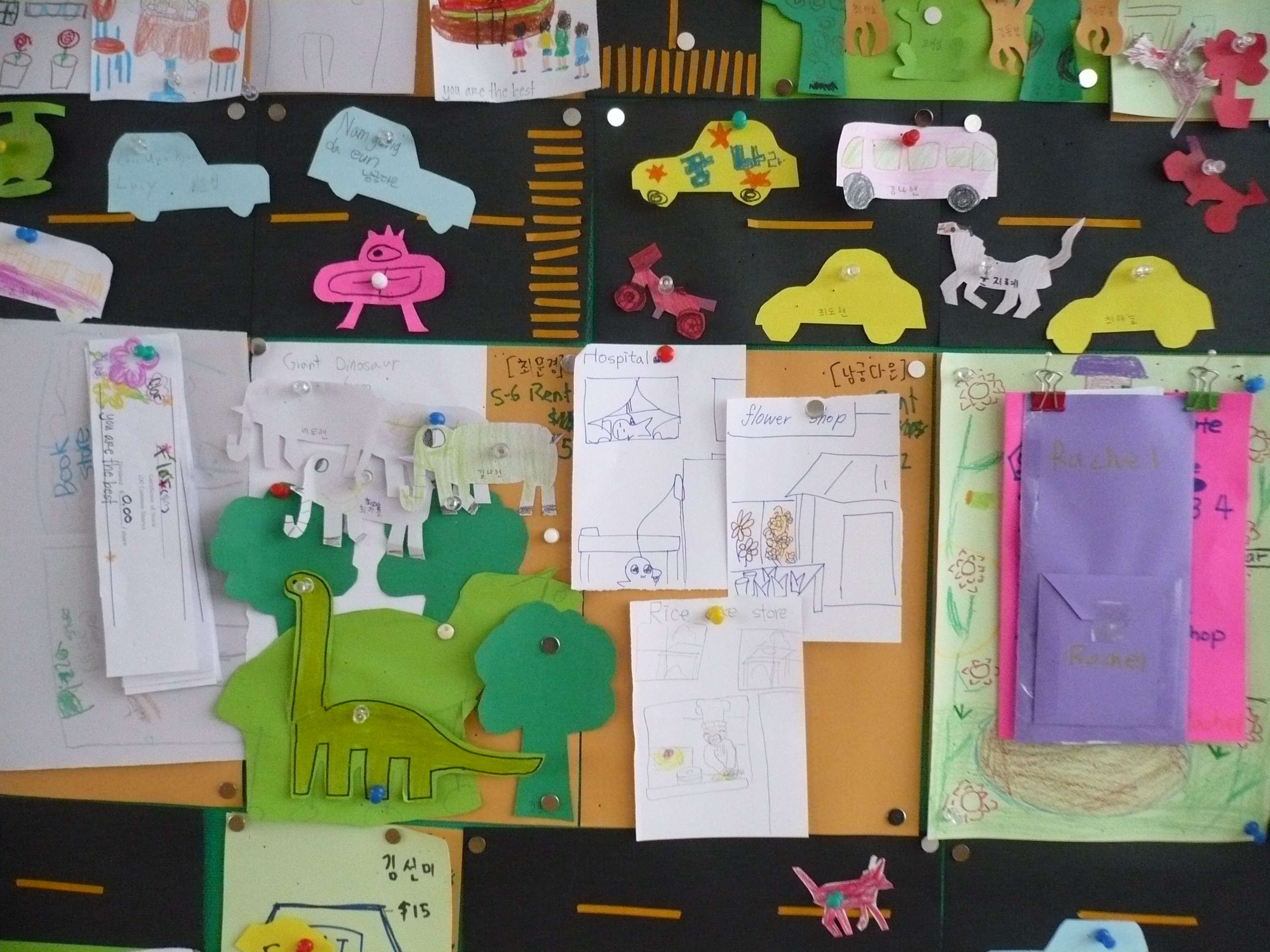

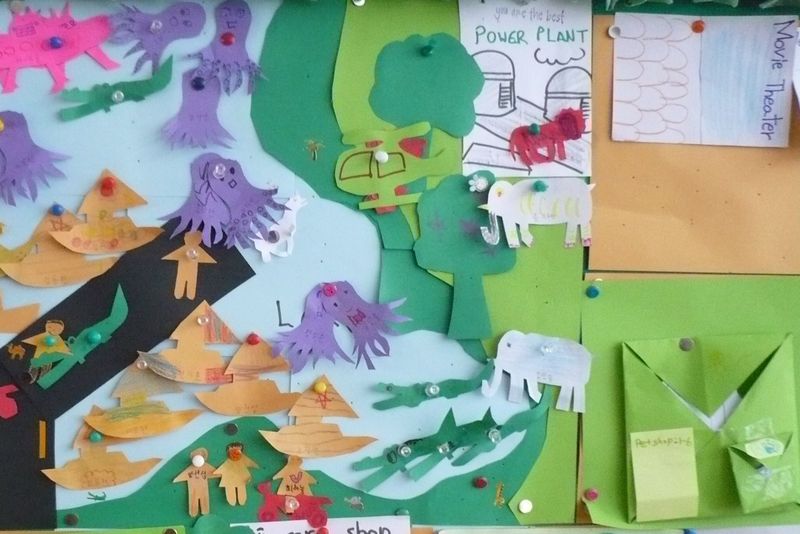
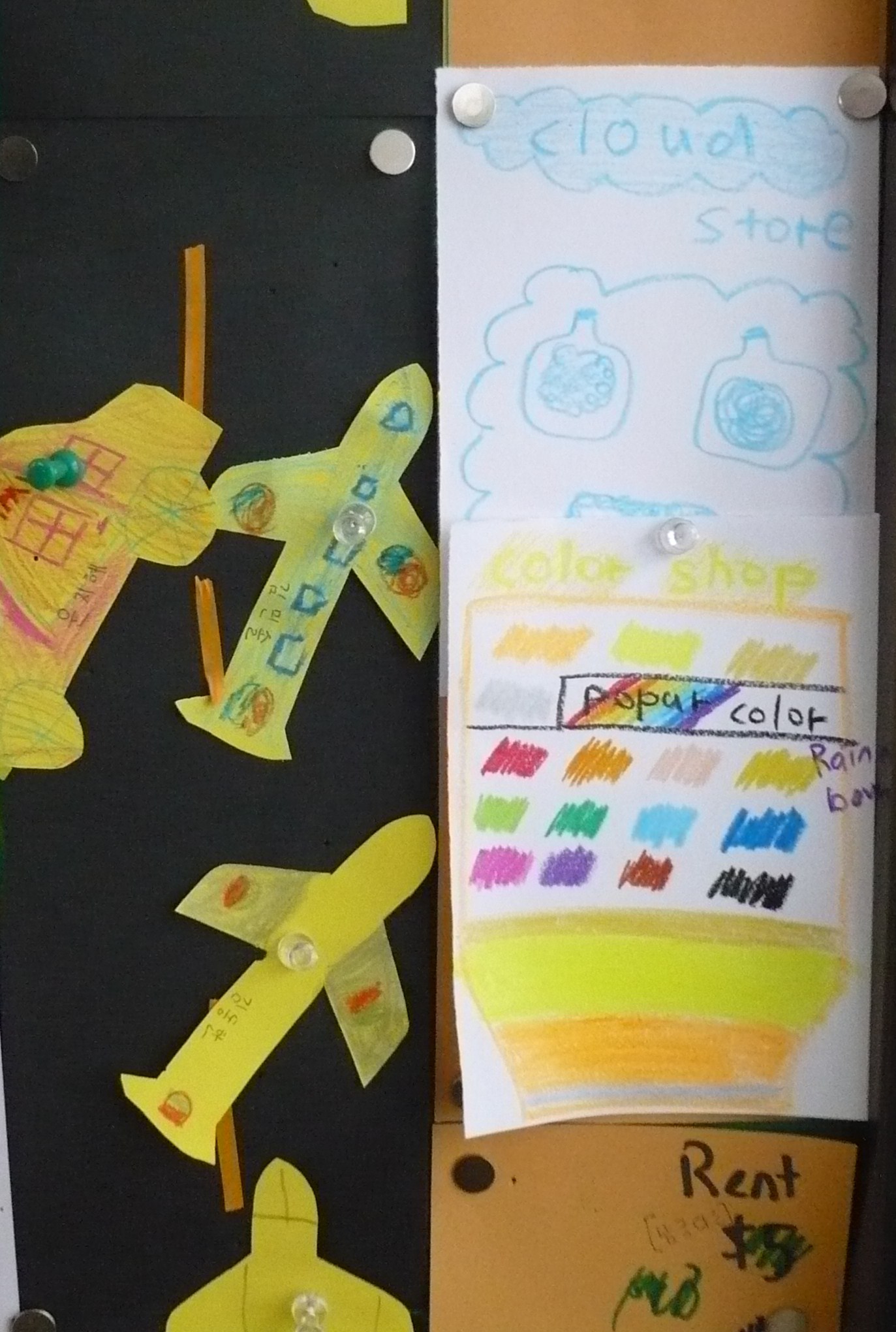
![]()
Caveat: 제목: 공룡액자
I don’t know why exactly, but I love this picture that my first-grade student Eun-ji made for me. She wrote 제목: 공룡액자 in upper left and bottom center. It means “Title: Dinosaur Picture,” roughly. She wrote my name, 왜제렏 (my own prefered transliteration), but then appeared to have second thoughts and crossed it out (or else maybe she experienced the vandalism of one of her peers?), and wrote 선생님께 (to teacher) instead.
And here is a picture of the sixth grade town-building class. These are five girls who refuse to leave – the picture was taken 20 minutes after the end of class, and they’re still messing around with arranging things in the town, discussing things they want to do, decorating their houses and businesses, etc.
Caveat: Optional School
I've always wondered what it would be like to to run a school that was genuinely, completely optional for children. Partly, it's a sort of what-if, child-empowerment question that has lingered with me since my own hippyish origins. Partly, it's some curiosity as to what might be the challenges of such an operation, from the standpoint of things like curriculum.
The Hongnong summer school seems to be my chance to see how such a thing might work. Any given kid shows up one day, and not the next. A colleague teacher comes by my classroom at 10 AM, and deposits a pair of visiting nieces with me, because the teacher's got something "important" to do. "This is my nephew [sic]. Can she stay here for a while?" "Sure," I grin, and a preschooler in a soaking wet purple shirt charges happily in amongst my third graders and begins headbutting her older peers, like an ecstatic goat. I give her a paper cut-out alligator and some crayons.
The consequence is that there's very little chance to build up any kind of class-to-class "progress" – each class session becomes a stand-alone daycare operation, where even the nominal breakdown by age or ability no longer holds.
Not even the physical environment holds steady. The school is under constant, heavy construction. Yesterday morning, I entered my classroom to find two workmen hanging out the window, doing something arcane with a power drill. And then during the JET test prep class, the power went out. Whoops… I guess we need a new lesson plan that doesn't require the computer (which I was using to play the CD with listening sections on it).
And you know what? I don't mind. I'm not bad at rigidity and structure, tempermentally. But I've always harbored philosphical reservations about it. So here we are. What shall we do today?
Caveat: … and she gave to me her still beating heart.
It's not what you think. Just another day in the classroom. I got a present from a student: the end result of a science class where they vivisected a frog.
Caveat: Dramatic Arts… or Not
After more than a week of practicing, 35 minutes a day (minus weekend, of course), I've decided to try to benchmark the progress (or lack thereof) of my third graders' effort to make a little musical play.
I'm feeling the pain of my own lack of experience in teaching / directing a dramatic production, definitely. Especially with a bunch of only marginally focused, limited-English-speaking, hyperactive 8 year olds (Western age counting – Koreans call them 10 year olds).
We're doing a little 7 minute-long musical production I found on one of the kindergarten curriculum DVDs, where I've added some characters and dialogue to accommodate the larger group, but kept the songs, which are simple and the kids seem to like them.
Here's some video I made of where things stand. Pretty rough.
Caveat: The Evolving Town
Here are some pictures for the last week’s evolution of the town (“Washington, SK”) that my sixth graders are making. The changes are more subtle than during the first week. But it’s definitely continuing to get more complex.
Friday:

Monday:

Tuesday:

Wednesday:

Thursday:

![]()
Caveat: Dropping ants from toy helicopters to see if they can survive
I saw a Korean popular science game show type progrom where they were dropping ants from toy helicopters and then looking for the ants to see if they survived the fall. The ants survived, of course. I think ants are of such low mass relative to surface area that falling through air is like falling through water for something larger… the air resistance means their terminal velocity is quite low or something like that. They ride the air down like a feather, floating and wafting about.
Today I had a lunch of delicious kong-guk-su (handmade noodles in an iced soy soup, with cucumber) – I went out with Cheor-ho.
I thought my first grade class went well today - I'm not sure why I think that, since the kids were running around like crazy monkeys. Maybe I just felt more peaceful about that fact? For a while I had them sitting in a circle on the floor with me, while we read a story. I would stop and ask them simple questions, based on the model of the story: "Do you want some milk?" "Yes." Miming, going around in the circle. Before that, the kids had gotten hyper throwing paper airplanes we made, too.
I'm trying to get my sixth graders to start buying and selling land from each other in the town we've built. But they're too respectful of each other's prerogatives… or too shy to aggressively buy and sell, even though they have no problem hurling insults at one another. It's interesting observing these cultural differences, and to reflect on what implications they may have (if any) for how Korean capitalism actually works.
Caveat: Des Moines, SK? Paris, SK; Washington, SK.
When I first got to Gwangju, in April, I was inclined to describe it as the "Des Moines" of South Korea. But having lived in glorious, hillbilliac Yeonggwang for the last 4 months, and returning there to spend the afternoon today, I thought, "jeez, it's like coming to Paris."
I hung out in a cafe (Yeonggwang doesn't really have cafes). I had a scone. I bought some real "imported from US" cheese (for about a dollar an ounce), took it home, and now I'm watching NCIS and eating cheese and crackers. Call it a break from Korea.
After one week of teaching summer classes, here are my thoughts on the curriculum I developed and rolled out for myself.
For first grade: medium-to-OK; about what I expected; it could be more organized, but those first graders are hard to manage, especially on my own, so I figure it could be worse; the best material is when I have them moving around playing (role-playing, vaguely), acting out story-lines from stories we've been reading.
For third grade: not going well; they were really into the role-play last month, but I think I got too serious about it, and showing them videos (i.e. Spongebob) to give them ideas actually distracts them and they lose their focus; I'm going to have to rethink, and change something.
For sixth grade: I've never had a more successful self-developed curriculum! They love it; they come in early and demand that we start immediately, and they refuse to leave the class after the time is up; mwahahaha – I win ^_^. They've named our simulation bulletin-board town: Washington, SK (cf. Washington, DC, I guess, but in South Korea).
Caveat: Can you play Sim City using construction paper and scissors?
Yes.
I’ve started a project to build a “town” with my 6th grade class. There are turns, they buy and sell property, start businesses, etc. A classroom economy.
Here are 3 shots of the first 2 days of the town. See how it’s growing, already? Hmm… I hope this works out – the kids (admittedly a small group) seem really into it – more than I even had expected. But they could lose interest. We will see.
I’m really proud of the traffic circle I made.
Caveat: Summer School
The school is a mess – a construction zone. Most of the teachers and, more happily, the administrators, are missing-in-action (they get longer vacations, because they’re “real” teachers, unlike the foreigner types). But I’m teaching “summer camp” classes. They’re awesome. No coteacher to have to work with or around or behind. I get to make up my own curriculum. And I know the kids already, so I already have some rapport.
I took some “class portraits” today, because I really want to make a serious effort to learn these kids’ names. Korean names are so difficult to learn, but except for the first graders I mostly have them down. So now I have pictures of them to study and to match up to names, as practice.
Here is my number-one super favoritest class – the 3rd graders.
And here are the first graders, behaving better than usual.
Caveat: what the teachers are themselves
“No printed word, nor spoken plea can teach young minds what they should be. Not all the books on all the shelves – but what the teachers are themselves.” — Rudyard Kipling
Caveat: I sing badly, but the kids don’t care
Here is a video I made last Wednesday of me with the middle group of preschoolers, dancing to the Nadia Gifford video of the "Knees and Toes Song." [The title says 2009, but it should read 2010. Hazards of cut and paste.]
Caveat: Eingrsh
This is not a satire. I had a student recently who actually spelled "English" as "Eingrsh" – which perhaps was an effort to approximate the Konglish pronunciation of said language.
I have finally figured out how to deal with the use of the phrase "nice to meet you" as a general purpose, anytime greeting. I answer with "저음 뵙겠습니다! [cheo-eum bwep-get-seum-ni-da]" This translates, literally, as "For the first time I will be seeing your honored person," but it's the general way of saying "how do you do?" upon a first meeting. By answering their "nice to meet you"'s in this way, I can convey to my students, clearly, that "nice to meet you" isn't what we use, in English, for subsequent meetings. Why do they say it, then? Because they're translating the Korean "만나서 반갑습니다 [man-na-seo ban-gap-seum-ni-da]," which translates literally as "nice to meet you" but is used whenever you're glad to see anyone.
Caveat: Monkey Meme
 The monkey meme continues to spread like wildfire through the fifth grade. Yesterday I had students announcing to me:
The monkey meme continues to spread like wildfire through the fifth grade. Yesterday I had students announcing to me:
- 1) “I’m a crazy monkey girl!”;
- 2) “I’m a zombie monkey! Uh! Ohhh!”;
- 3) “I’m a lovely [by which I think she meant loving or kind] monkey!”;
- 4) “I’m a happy monkey!”
Caveat: Knees, Toes and Monkeys
I have been discovering how much fun the younger students have with “TPR songs” – “TPR” is an acronym for “total physical response” which is a rather grandiosely-named language-teaching methodology which basically means “have kids move around because it activates their learning.” I’ve always been a believer in this – although I was always personally a very visual learner, I know there are kids who learn better when material is connected to movement (kinesthetic learners). So TPR songs just means songs where there are physical actions that the kids can do.
I’ve been going out into youtubeland and finding good videos to show the kids. Some are more successful than others. Here are two that have been by far the two most popular so far. I have that CJ version of “5 little monkeys” stuck in my head, and the every time I see a first grader now, she or he will say “teacher! knees and toes!”
Caveat: Handwriting
I was having a problem, when I started out, with my first graders “lying” about who they were. They would switch names with each other when I was calling attendance. I was generally able to sort things out… but it often would eat up 10 to 15 minutes of class time, and would tend to put them in a rowdy mood.
For that, however, I discovered a fairly elegant solution. I have them write their names on little slips of paper that I hand to them as they enter the classroom. For whatever reason, they don’t seem as comfortable making stuff up in writing – partly, at that age, it’s pride in being able to put their own names in writing. Also, I think part of the fun in name-switching is that it’s a performance for their peers, which having them write mostly eliminates. I insist that they write their Korean names – “English names” are too fluid and their level of ownership of them is weak at best.
But this has the consequence that I have to decipher a bunch of 7 year-olds’ hangeul handwriting. So far, I’ve always managed fine, except in an instance where the kid only put down a family name (이 = Lee) – which, given how Korean family names work, managed to narrow it down to 7 possibilities! Here is a picture 4 examples of hangeul handwriting that I feel particularly proud of having been able to decipher.
Caveat: 쭈쭈!
I’m sorry if that title offends anyone. Learning a language is fraught with difficulties – and one of them is that people are reluctant to talk about “bad words,” but somehow we must nevertheless learn them.
I had an unfortunate day, today. Specifically, my afterschool first grade class (difficult to manage even on regular days), was just too wild. I had one kid throwing things. I mean, REALLY throwing things. He nailed me on the head with rather hefty crayon – THWACK!
So I took him aside and yelled at him a bit. These are little kids. How do you manage this, when you don’t have a co-teacher who can speak Korean, nearby? My Korean Language skill isn’t adequate to express my feelings about this kind of behavior in a convincing way to the kids.
And then there was the kid drawing pornography. I mean, seriously… he’s what, seven (or at most 8 or 9, if you want to count in the Korean style which gives people extra years)? I suppose kids will be be kids, and draw weird stuff, sometimes. But he was drawing anatomically correct, adult-looking women and even coloring between the lines!
And that wasn’t enough. The clincher is that he was then running around the room, yelling “쭈쭈! 쭈쭈!” And all the kids thought this was hilarious.
This gem of vocabulary isn’t in any dictionary, nor online. And it’s not something I could figure out by typing “쭈쭈 meaning english” into google, either. Nevertheless, somewhat eerily, Korean language spellcheckers don’t flag it as wrong, either. It’s a “secret” word?
My best guess, based on the child’s illustrations, combined with some weird dance moves two of the other boys started doing, is that it means “tits.” Charming. If any of my better-at-Korean-than-I readers want to provide me with some reassurance that my reading isn’t too far off, I’d appreciate it, but I realize it may be a bit awkward.
I couldn’t find a Korean teacher anywhere in my wing, when I finally got fed up and decided to try to find someone to talk to the boy in Korean. I ended up hauling him down to the staff room, but that was a bit awkward, since I walked in saying “쭈쭈” myself, among other things, but I found the principal and vice principal in there, in some kind of high-level-looking meeting. Ah well, I left the boy with my colleague. Hopefully things will sort out on Monday.
Caveat: Pet Pop Star
We were in the 4th grade class. We were practicing the following simple dialogue pattern: “Who is he/she?” “He/she is ___. He/she is my ___.” For example: “Who is she?” “She is Mary. She is my sister.”
My co-teacher has put up some possible “people” and some possible “relations”: for the “people,” there were pictures of various famous people or characters the kids were sure to know the names of, including Einstein, Hermione (as in the Harry Potter character), and others; for the “relations,” she provided “aunt” “uncle” “brother” and “sister.”
So there is a 4th grade girl who has the English name of Hannah. The teacher pointed at the picture of 정지훈 (Jeong Ji-hun), a Korean pop star and actor who sings under the pseudonym of “Rain” but also uses his real name for action movies. He’s considered quite handsome in Korea. The girl’s English is excellent – probably the best in the class.
The teacher asked, “Who is he?”
Hannah said, unhesitatingly, “He is Jeong Ji-hun. He is my pet.”
Caveat: 말이 많으면 쓸말이 적다
There are some workmen doing work on the “staff” bathrooms that I had been in the habit of using. Actually I have no idea if they’re officially “staff” bathrooms, but they’re across from the Principal’s office so I that what I think of them as. Anyway, because of that, I started using the bathroom across the little courtyard to the west of my classroom. Why am I telling you this, you might be wondering?
In this bathroom, someone has posted little Korean aphorisms and proverbs over each urinal. So while I use the urinal, I get a Korean language lesson – if I can sort out the vocabulary. I try to choose different urinals, to get some variety.
The above aphorism (말이 많으면 쓸말이 적다 = mal-i manh-eu-myeon sseul-mal-i jeok-da) seemed to make sense – the only word that puzzled me was “쓸” but I guessed it meant “wise,” which would give the meaning of the phrase as “there are many words but few wise ones” which makes sense. But it turns out (according to my coteacher) that it means “will-be-used” (roughly). That gives “there are many words but few that will be used.” I don’t understand this quite as well, but it’s not impossible.
Yesterday, I had a sudden “aha!” moment in thinking about serial verbs in Korean. Serial verbs are where several different verbs get strung together, each with a finite ending, with only the last bearing all the extra endings (marking politeness, etc.). A simple example would be “공부해 봤어요” (gong-bu-hae bwass-eo-yo = I tried to study). I suddenly thought that maybe these serial verbs are the Korean language analogue of periphrastic verbs in English (periphrastics are also sometimes called two-part verbs, like “get up” “get down” “get in” “get out” etc.), not syntactically (obviously), but definitely in terms of what you might term “semantic pragmatics” – they’re what the language turns to when it needs a new meaning. I’ll think about this.
In other news: I am learning a lot from my coteachers. Ms Ryu, with whom I teach the 3rd graders, is a very patient and kind teacher, and she has an amazing focus on positivity and the kids behave amazingly well for her. I need to learn to emulate her tricks and style. She spends a lot of time explaining to the kids what will happen. This is not a trick I can use effectively, given I’m supposed to be speaking English and that my Korean is so bad that I doubt I could get my ideas across very well anyway. But it does underscore the importance of being consistent and predictable, which is something I CAN do, and which helps the kids to know what will happen. She always writes what the lesson objective will be, on the board, and sometimes even has the students read it. I could do this, in English, too. [e.g. “Students learn to say: I like __ / I don’t like __”]
My other coteacher (the “main” one), Ms Lee, with whom I teach the fourth graders, is generally quite focused on keeping things “fun,” and she is a more kid-centered, western-style teacher. The consequence, with Korean kids, is that there are more moments when the classroom seems out of control, but I think if you can tolerate this state of affairs, it can be good for learning, too. It’s a fine line between “seems out of control” and “really is out of control.”
Caveat: Stasis
Lately I've been feeling burned out. I know what you're thinking: I just started this job! No… I'm burned out on change. Traveling almost continuously for 8 months, living out of a suitcase. The stress of finding the new job. The complications around my housing situation once I started my new job. Those things have me feeling burned out.
So my solution to that is to go into a sort of near-hibernation mode for a while. For a weekend. I didn't do much this weekend. The farthest I traveled was the grocery store. I still feel exhausted on Monday morning. But I think I'm a little less "burned out," hopefully.
I need to solve a problem with my first grade after school class: it's too big (20-something kids) and they're too unfocased (with too low-level English) for my regular song-and-dance strategy to work. I need new strategies to keep these kids' attention. I'm really opposed as a matter of principle to using the giant TV/computer monitor… as a rare, native-speaker resource in this school, it seems like a terrible use of "me" to be sitting there pushing a button on a computer. And I've always been skeptical of the effectiveness of technology-driven language lessons – especially with children.
On the other hand, I had the best class I've had in ages with my sixth grade after school class. We did something a bit like mad-libs, they would randomly make up nouns, places, verbs, characters… then they had to tell little stories about them. Being sixth graders, the nouns included things like toilets and trashcans and dog poop, and the characters were mostly each other or cartoon characters… but they had a lot of fun, making up little disconnected stories. We're working on "how to make a narrative."

